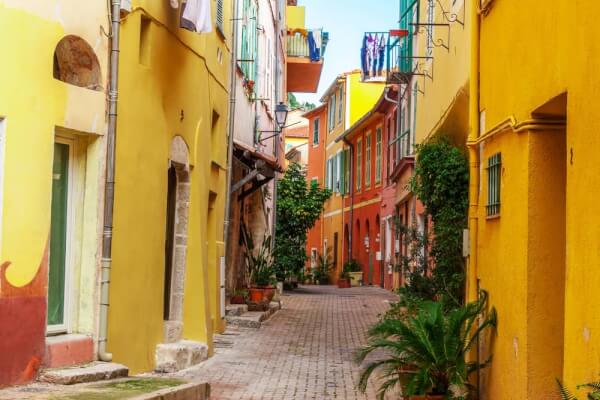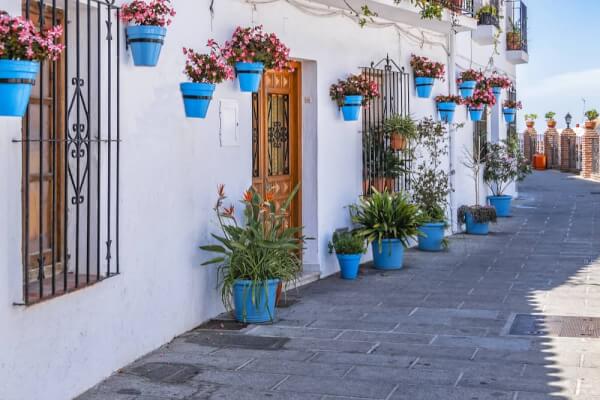Buying property in Ireland as a foreigner
The essential guide to buying property in Ireland as a foreigner, including property prices, where to buy, mortgages, fees and more.

Looking to live life at a more relaxed pace? When it comes to moving abroad or buying a holiday home, Spain is always a popular choice.
With long hours of sunshine, beautiful scenery, great food and friendly people, there’s lots to love. And if that’s not enough, property prices are quite low compared to the rest of Europe¹, which makes getting your own place in the sun all the more tempting.
Unfortunately, there’s more to buying and owning a property in Spain than just paying the sale price. The list of fees and property taxes is long, and costs can quickly add up.
In this guide, we’ll walk you through all the essentials you need to know about paying property tax in Spain. Hopefully, this should make the system easier to navigate, so that the process of buying your dream Spanish home becomes more straightforward.
Broadly speaking, there are two main categories of taxes you need to consider when buying a property in Spain. These are sales taxes and maintenance taxes.
Sales taxes are usually one-off costs due at the time you buy or sell your property, whilst maintenance taxes are payable on an ongoing basis.
Let’s have a look now at each category.
Which sales taxes you’ll pay when buying a property in Spain depends on whether it’s a new build or a resale. There are also a number of fees due on every property purchase, just like in the UK.
A new build is a brand new property that is being sold for the first time. You’d normally buy this kind of property from a developer or a bank.
As a buyer, there are two taxes you’ll need to pay on new builds:
VAT. Known as IVA in Spain, VAT is currently set at 10% of the purchase price, except in the Canary Islands. Here, VAT is known as IGIC (Impuesto General Indirecto Canario), and it’s 6.5% of the sale price.
Stamp duty (known as AJD or legal documentation tax). This is normally between 0.5% and 2% of the purchase price. However, it varies in different regions, so it’s a good idea to check with the regional government. In Madrid, for example, stamp duty is 0.75%, while in Valencia it’s 2%.
A resale property is any property that isn’t being sold for the first time.
In this case, you won’t have to pay VAT or stamp duty. Instead, you’ll only need to pay transfer tax (impuesto sobre transmisiones patrimoniales) which is due upon signing the contract of sale.
The rate of transfer tax you’ll pay can vary depending on the property price, and the region. But you can expect it to be between 8% and 10% of the sale price.
Land appreciation tax is payable on every transfer of property, whether it’s a new build or a resale.
It’s a tax on the increase in value of a property since the last transfer of ownership, and it’s due to the municipality where the property is situated, within 30 days of the date of sale.
The tax is calculated as a percentage of the property’s cadastral value - the value given to the property by the municipal government - but it can vary quite a lot. Factors affecting it include the property’s size, whether it’s a new build or an old one, the number of years the seller has owned the land and even the municipality’s population.
Land appreciation tax is normally payable by the seller. However, it’s not unusual to negotiate its payment during a sale, and some vendors will insist the buyer should pay it directly, or at least refund it. You can confirm the cost at the municipal tax office (recaudación municipal)
However, there may be good news on the horizon for property owners looking to sell a home in Spain. The Spanish Constitutional Court has recently annulled the Plusvalía municipal law⁴, claiming that it is unconstitutional due to issues with how the tax is calculated. Unless this ruling changes, this is likely to mean that you won’t have to pay this land appreciation tax for future property sales in Spain.
If you sell a property in Spain, you’ll have to pay capital gains tax on your profits from the sale. This is calculated as a percentage of the sale price.
Capital gains tax is 19% for non-residents, while residents pay it on a sliding scale as follows⁵:
If you’re a resident, however, you can apply for tax relief⁶. This is provided you’ve lived in the property for at least three years before selling it, and that you reinvest the proceeds of the sale in your new main residence.
While strictly speaking, these aren’t taxes, there are still many other fees due on property purchases in Spain.
Here’s what else you need to factor into your initial budget:
With the initial sales taxes out of the way, it’s time to turn our attention to the regular property taxes you’ll pay in Spain.
As a property owner, you’ll need to pay both property ownership tax and wealth tax, whether you’re a resident or a non-resident.
If you’re a non-resident, you’ll also have to pay income tax on real or potential income generated by your property.
Property ownership tax (impuesto sobre bienes inmuebles, or IBI), is due to your local government authority. It’s based on your property’s cadastral value and is payable each year.
Because it’s a local tax, it varies from area to area. As a general rule, IBI is usually about 0.4% to 1.1% of your property’s cadastral value⁷. You can check the total amount of tax due at your local town hall.
Wealth tax in Spain is a tax on the total value of your estate on 31st December each year, including your property. The tax applies to both residents and non-residents, but there are some differences.
If you’re a resident, you pay wealth tax according to the rules of the local authority in the autonomous community you live in. Some regions use national rules, whilst others have their own rules, including different tax-free allowances and rates.
Non-residents, on the other hand, pay wealth tax according to national rules.
Currently, you don’t have to pay wealth tax on your first €700,000. Residents also benefit from an additional tax-free allowance of up to €300,000 per individual on the value of their main residence. Anything above your tax-free allowance is taxed according to a sliding scale, ranging anywhere between 0.2% and 3.5%⁹ - however, this top rate is only for estates worth more than €10 million.
If you’re a non-resident, you have to pay tax on all income generated in Spain, including income from property. This tax is called Impuesto sobre la Renta de No Residentes, or IRNR.
Unfortunately, IRNR is due whether your property actually generates income or not. You’ll need to submit a return (either quarterly or annually, depending whether your property is rented or not), and pay any tax due.
If you do rent out your Spanish property, calculating the tax due is relatively straightforward. If you’re an EU citizen, you can deduct any rental expenses, including any interest you pay on a mortgage. The tax due will be 19% of your net rental income, and you’ll need to submit tax returns on a quarterly basis.
If you’re not an EU citizen, you can’t make any deductions. The tax due is 24% of your gross rental income.
If you don’t rent out your property, you’ll be taxed on the potential income your property could generate if you had rented it out. Currently, this is 1.1% of your property’s cadastral value. You can find this value on your latest IBI bill.
The tax due is 19% for EU citizens and 24% for citizens of other countries.
Many Spanish property taxes can be paid online¹¹, but non-residents may first need to register to pay tax in Spain. You’ll need to make sure you have a Foreigner’s Identity Card (NIE) number and register with the Agencia Tributaria⁸. You can also register with a local police station within 30 days of arriving in Spain.
You may also need to complete a Modelo 30 form to register to pay tax in Spain as either a resident or non-resident for the first time. You’ll find all the information, including details of how to pay Spanish property taxes and file tax returns, on the Agencia Tributaria website.
If you need to send money to Spain to cover your property taxes or other fees, it’s important to check that you’re not paying too much for international transfer services.
If you use your bank, it’s likely to charge high fees and add a mark-up to the exchange rate. This could end up making your transfer more expensive, and it’s the last thing you need on top of all those other property taxes and charges.
Wise is the ideal solution. Send money to Spain with Wise and you’ll always get the mid-market exchange rate. This means no mark-up, only the fairest rate around. Plus, you’ll only pay one small transfer fee, clearly stated upfront.
And when yousign up for a Wise multi-currency account, you’ll have even more low-cost ways to manage your money internationally. You can hold money in euros and 50+ other currencies at once, and switch between them when you need to.
You can even get an international Wise debit card, perfect for making property tax and fee payments online. There’s no foreign transaction charge, only a tiny fee to convert the currency if you don’t already have EUR in your account. And the conversion is automatically done at the mid-market rate at the time of the transaction, so you don’t need to do a thing.
Buying property in another country is always a challenge, and the long list of taxes in Spain doesn’t make it any easier.
But hopefully after reading this helpful guide, you should be better equipped to understand and pay property taxes in Spain. Good luck, and enjoy your time in sunny Spain!
Sources used for this article:
Sources checked on 28-Oct-2021.
*Please see terms of use and product availability for your region or visit Wise fees and pricing for the most up to date pricing and fee information.
This publication is provided for general information purposes and does not constitute legal, tax or other professional advice from Wise Payments Limited or its subsidiaries and its affiliates, and it is not intended as a substitute for obtaining advice from a financial advisor or any other professional.
We make no representations, warranties or guarantees, whether expressed or implied, that the content in the publication is accurate, complete or up to date.

The essential guide to buying property in Ireland as a foreigner, including property prices, where to buy, mortgages, fees and more.

Everything you need to know to buy property in Portugal as a foreigner from the UK. Read about where and how to buy property, average house prices, and more.

The essential guide to help you buy property in France as a foreigner coming from the UK – from fees and taxes to average house prices.

The essential guide to buying property in Italy as a foreigner, including average prices, best places to buy and key legal information.

Want to buy property in Spain as a foreigner from the UK? Read our guide on buying property in Spain, including average prices, legal info and more.

The essential guide to buying property in Turkey as a foreigner, including property prices, where to buy, mortgages, fees and more.